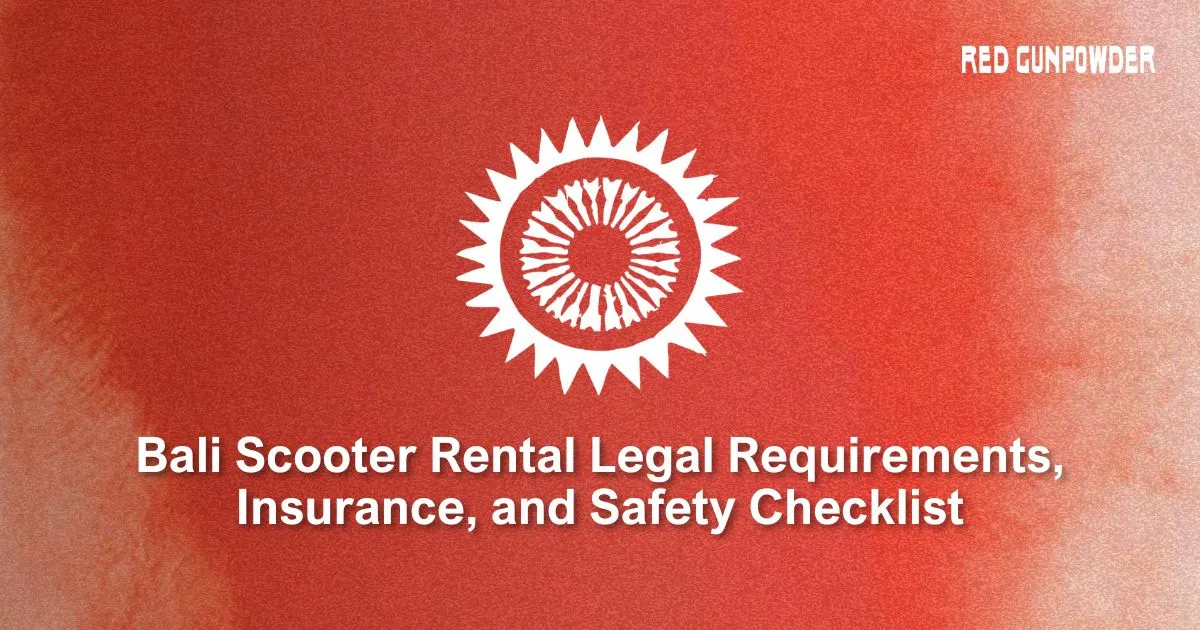For many travelers, the quintessential Bali experience is the freedom of a scooter: zipping through emerald green rice paddies, navigating the narrow backroads of Ubud, or chasing the perfect sunset view in Uluwatu. The ability to explore at your own pace is unmatched.
However, this freedom is governed by strict local laws. Given the Bali government’s recent focus on increased traffic enforcement and respectful tourism, riding illegally is a gamble that can result in hefty fines, detention, or, worst of all, unmanageable medical debt.
As experienced riders on the Island of the Gods, we stress that doing it legally and safely is the only way to ensure your trip remains stress free. Here is the ultimate, detailed guide for renting and riding a scooter in Bali with complete peace of mind.
Read also: Bali Transportation Options and Best Advice for Tourist
Table of Contents
ToggleThe Three Legal Cornerstones (Non Negotiables)
These are the absolute minimum requirements you must meet to be compliant with Indonesian traffic law (Undang Undang Lalu Lintas).
1. The Mandatory International Driving Permit (IDP) with Motorcycle Endorsement
This requirement is strictly enforced and is the primary reason tourists are stopped and fined.
The IDP Requirement
You must possess an International Driving Permit (IDP). This permit serves as a multilingual translation of your domestic license and must be obtained in your home country before you fly to Bali.
The Motorcycle Endorsement (Class A)
Crucially, your IDP must include the specific authorization for motorcycles (typically Class A). If your IDP only covers cars (Class B), it is legally invalid for operating a scooter in Bali, even for small 110cc models like the Honda Scoopy or Vario.
The Insurance Trap
If you are involved in an accident and your IDP does not have the motorcycle endorsement, your comprehensive travel insurance will almost certainly deem your policy null and void, leaving you personally liable for all expenses, including costly medical evacuation.
What to Carry
You must always carry both your physical IDP booklet and your original home country motorcycle driver’s license. The IDP is useless without the original license.
2. Minimum Age and Passenger Rules
Age: The minimum legal age to operate a scooter in Indonesia is 17 years old to obtain a local license, and most rental shops require you to be 18 to rent. Any insurance policy will require the driver to be 18+.
Passenger Limit: Scooters are designed for a maximum of one driver and one passenger. Riding three or more people on a single scooter is a severe, easily noticed traffic violation that results in an immediate fine.
3. Valid Vehicle Registration (STNK)
The STNK (Surat Tanda Nomor Kendaraan) is the vehicle’s official registration and tax certificate.
Proof of Legality: A reputable rental shop will provide you with a photocopy of the STNK, which is usually stored in a small plastic pouch attached to the key ring. This proves the vehicle is legally registered.
Critical Check: Before accepting the bike, verify that the license plate number on the scooter matches the number printed on the STNK. If the police stop you and the STNK is missing, expired, or doesn’t match the vehicle, you are liable for the fine, not the owner.
Essential Safety and Pre-Ride Checks
Going beyond the paper requirements, these steps ensure your physical safety and protect you from liability.
Secure Specific Motorbike Travel Insurance
Never rely on a standard travel insurance policy; specialized coverage is a necessity. Confirm that your insurance plan explicitly includes medical and evacuation coverage for accidents while riding a motorcycle up to 125cc or 150cc (the common tourist rental sizes). Remember that the insurance policy will only be valid if you meet the legal requirements, meaning you must possess the International Driving Permit with the correct motorcycle (Class A) endorsement. Providers like World Nomads and SafetyWing are known for offering flexible policies that can be customized to include this crucial scooter coverage.
The Essential 5 Points Pre-Ride Inspection
Before you hand over your money, thoroughly inspect the scooter for roadworthiness:
- Brakes: The most common cause of tourist accidents. Squeeze both front and rear levers. They should engage smoothly without excessive pull.
- Tires: Poor grip means a high risk of slipping on Bali’s wet or uneven roads. Check tread depth and look for visible cracks, bald patches, or low pressure.
- Lights: Visibility is crucial, especially at night or in rain. Test the headlight (high/low beam), taillight, and both turn signals.
- Engine Sound: Indicates maintenance level and reliability. Turn the key and listen for strange rattling or sputtering.
- Pre-Existing Damage: Avoid losing your deposit over old scratches. Take a quick video walking around the entire bike, capturing the license plate and any existing damage before you start riding.
Read also: How and Where to Rent a Scooter in Bali: The Smart Traveler’s Guide for 2025
Helmets Are Non-Negotiable
Both the driver and the passenger must wear a helmet at all times. Ensure the rental company provides a helmet that is in good condition, fits snugly, and has a functional, securely fastened chin strap. A full-face helmet offers superior protection. Police will frequently stop you for this violation, with on-the-spot fines generally starting around IDR 250,000.
Driving Etiquette and Handling Authorities
Follow Local Traffic Rules and Etiquette
Always drive on the left side of the road. In Bali, the horn is used less for aggression and more as a “hello, I’m here” warning signal when passing a vehicle or cornering blind. Be patient and expect traffic to merge intuitively. Always yield and show respect at ceremonies or religious processions.
Understanding Police Checkpoints
Police checks are common, particularly near busy tourist hubs like Canggu, Kuta, and major intersections. If flagged down, stay calm, pull over safely, turn off your engine, and remain polite. Present your IDP, original home country license, and the STNK photocopy immediately. If you are found to be missing a document or committing a clear violation, always request an official blue or red fine slip (receipt) for transparency and accountability.
Choosing the Right Scooter and Reputable Rental
Choosing the Right Scooter Model
For beginners or flat areas, models like the Honda Scoopy or Honda Vario 125 (110cc-125cc) are light and easy to handle. For couples or to handle the steep hills in Uluwatu or Ubud, models like the Yamaha NMax or Honda PCX/ADV 160 (150cc-160cc) offer more power and comfort.
Reputable Rental Companies
Choose companies that prioritize safety and transparency over the lowest price. Look for shops like Bikago, BaliMotion, or GFS-Bike, as they are known for good online reviews, offering optional damage and theft insurance packages, and providing 24/7 roadside assistance.
Ride Free, Ride Respectfully
Renting a scooter unlocks the very best of Bali. The small effort required to obtain your International Driving Permit with a motorcycle endorsement and secure the correct insurance is a vital investment in your safety and enjoyment. By respecting the local traffic laws, prioritizing safety gear, and always carrying the correct legal documentation, you ensure your adventure remains focused on Bali’s golden light and beautiful culture, free from legal worries. Ride safe, ride smart.






